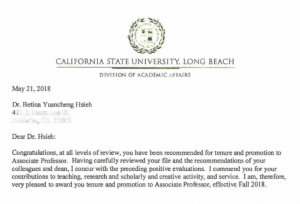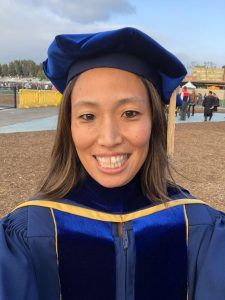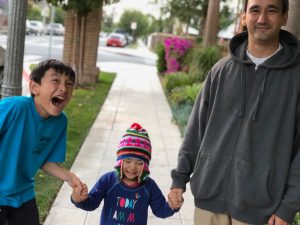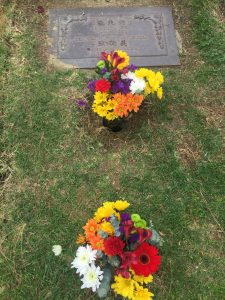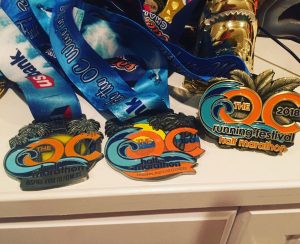
My medals from the last 3 years of running the OC Half Marathon
Some wise, more senior colleague once told me that an academic career is not a sprint, but a marathon. Yesterday, I finished my 3rd OC Half Marathon (running as part of Team World Vision) and my 8th half marathon overall, and never have the meaning of these words been more real for me. It was an incredibly tough training season as twice, after hitting the 10 mile mark in training (and particularly busy and critical times in the semester), I got hit with the flu, and had to take 7-10 days off of training. Here’s what I learned from this season:
- Pace yourself: While I didn’t get an overall PR in this race, despite the two major training set-backs, I did get a course PR of almost 5-minutes. This is because I was able to keep a relatively even pace throughout the race. I ALWAYS go out too fast and then right around mile 8, I slow down…a lot. Sometimes, there has been a 4-minute difference between my fastest and slowest mile splits — 4 minutes! Consistency was key in helping me finish this race and finish it well.
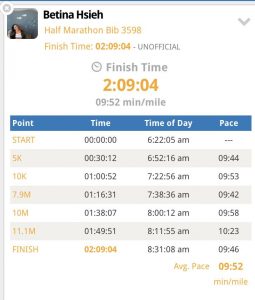
Check out those splits! (Ignore the monster hill at mile 11…)
This is also something I need to learn in life, especially my work life. I always am doing too much (especially at the beginning of a school year or summer or semester) and then I end up getting super sick or super stressed, and I either force myself through it, which has major consequences on my physical and mental health, or I begin dropping the ball which makes me feel terrible and that I’m not giving my best or doing my best.
2. We go farther together; Collaborate: Yesterday, for the first time ever, I ran with someone during the race. On our training runs, my friend Cheryl and I had stayed together most of the time, and I knew we ran at a relatively similar pace. My goal was to stay with Cheryl. While I helped her with pacing at the beginning of the race, she kept me going during mile 8 and beyond when I wanted to give up (despite the relatively tempered pace that we began with). Her encouragement, her partnership and her commitment to me made an incredible difference in my completion of the race and my success. I was so thankful to celebrate with her.
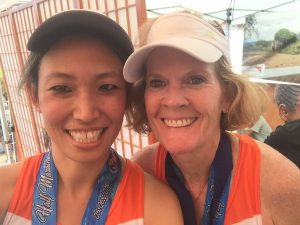
Cheryl and I after the finish!
This is also true in my work life. I’ve been really blessed in my life as an assistant professor to have a wonderful mentor who has walked (run) alongside me, supporting me with balancing all the demands of academia. I’ve also been super fortunate to build up networks of colleagues and friends (and colleagues who have become friends) from around the country and the world. Through working together, and working in and with communities, my work has not only become better but more meaningful and powerful. This is the power of collaboration in a world that is so normatively isolating.
3. Take time to be grateful. People make a difference and they need to know it. This morning, inspired by my team captain, Darlene, I created an infographic to thank those who had contributed to the fundraising part of my run. They came from various communities over time: my family, former teachers (who have become family), college friends, former colleagues (when I taught and worked in public schools), former (and current) students, church friends. It was so moving to me to take the time to think about all of these people who have come along with me on my 6-month training journey. And, that was just the monetary support. My team, my family, and additional friends have been cheering me on and providing support and encouragement throughout my training. Again, the power of collaboration in an isolating world.
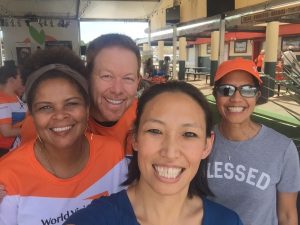
My team who are also my friends and support
This year, I was able to say thank you to my dear friend and mentor, Huong, who has supported me since I entered the university, by nominating her for a couple of mentoring awards, both of which she won. Acknowledging the support that others provide is so important to sustaining collaboration. People make a difference and they need to know they are appreciated.

My mentor, Huong, and I at the AERA REAPA SIG meeting where she was honored with a mentoring award.
4. If you don’t take the time you need to rest and recover, you make life so much worse for yourself. Okay, so everything else has been lovely, but here’s where things get real. I am terrible at resting. And when I am sick, I am terrible at recovering. When I had the flu the first time, although I did postpone the race that I had been training for at the time (the Oakland Half Marathon in March), I still insisted on holding FaceTime meetings with groups in class from my sick bed. When I had the flu the second time (less than 3 weeks ago), I literally hobbled to class (very ill) because I decided that I had to teach. Class the following week was fully online, and I needed to model second language practice by lecturing in French. Really?! Probably not the best life decision ever. I also only took 1 full week off of training, ran a half marathon 2.5 weeks later, then helped to lead a college meeting today (the day after said half marathon).
This is just not sustainable. I recognize it. I admit it. I know I have problems. I recognize that approaching tenure is not solving these problems. I also know that I continue to try to sprint out and then I have to hit a wall before I realize that I am struggling and am forced to slow down.
5. You can change even when it seems impossible. I have to say that reflection point #4 troubles me. There’s something confronting about confessing the level of workaholism you display in your day to day life and looking at it on a screen.
But, also, I made it to the finish line yesterday, in the strongest finish I ever had. I didn’t feel great, and I didn’t have energy to “kick it in” at the end, but afterwards, I was proud of what I had accomplished and the even pacing of the race.
I know I need to change. I’ve known if for awhile, although it is tough to admit, because I care so deeply about everything I do, and I do too much. I also know that I can’t change alone, that I’ve got to focus on a few goals, devote time and energy to those goals and keep moving forward in community. I know these things are hard, but that if I can do them, I’ll be a lot better off in the long run.
An academic life, especially one in which a person is deeply committed to research, teaching, service, family and balance, is a process not unlike training for a long run. Both are, at times, energizing, and at other times exhausting. Both are, at many points, overwhelming, and certainly not for everyone. But, both can also foster important collaboration and make a huge difference in one’s life and the lives of others, in community. It’s been a humbling training season, but perhaps the best race I’ve run.

